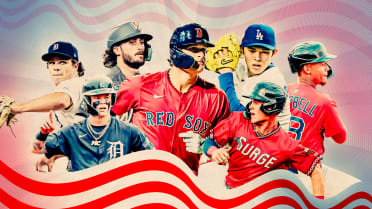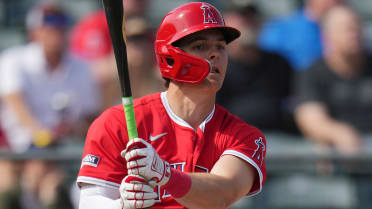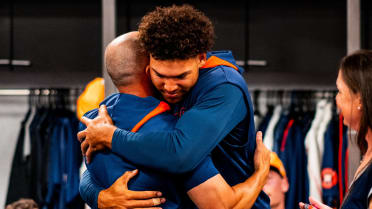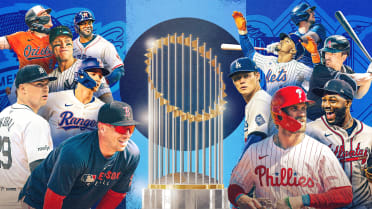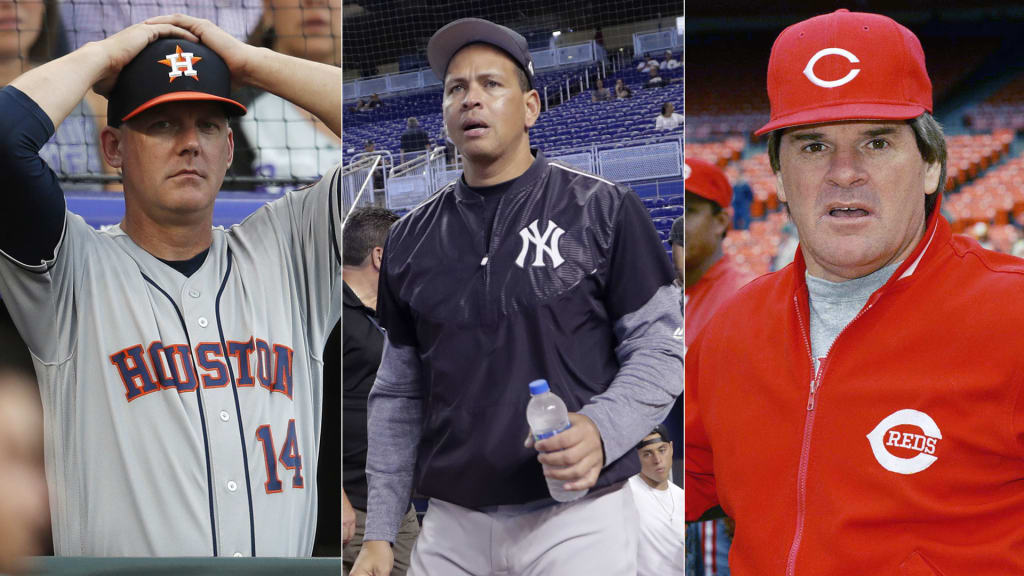
In January 2020, Major League Baseball suspended Astros manager AJ Hinch and general manager Jeff Luhnow through the end of the 2020 World Series as part of an investigation into allegations of electronic sign-stealing. This was the first time that Major League Baseball had assessed a suspension related to a case of this specific nature, but it was not the first time we’ve seen discipline handed out in the form of a suspension of some length.
Here are 10 notable suspensions throughout baseball history, in reverse chronological order. This list focuses on suspensions for baseball-related transgressions.
2020: AJ Hinch and Jeff Luhnow, Astros manager/GM -- through 2020 World Series
Hinch and Luhnow were suspended without pay after an MLB investigation found that the team utilized technology to steal signs in 2017 and ‘18 -- including during Houston’s ‘17 World Series championship run -- after MLB had issued warnings against that sort of behavior. The investigation found that neither Hinch nor Luhnow directly participated in the scheme, but both were held accountable for failing to prevent or stop it. In a news conference the day the suspension was announced, Astros owner Jim Crane announced the firing of both Hinch and Luhnow. Former Astros bench coach Alex Cora, who was found to be instrumental in setting up the sign-stealing scheme, was dismissed as manager of the Red Sox, and a separate MLB investigation was ongoing into another sign-stealing scheme allegedly utilized by Boston in '18.
2017: John Coppolella, Braves GM -- permanently banned
Coppolella resigned as Braves general manager after Major League Baseball disclosed infractions relating to the organization’s signing of international players in October 2017. In November of that year, he was banned for life due to the results of the league’s investigation. The team was found to have given additional money to international prospect signings, exceeding their bonus pool allocations. Coppolella had worked in baseball operations since 2000, beginning as an assistant with the Yankees and climbing his way up to the position of GM with the Braves.
2017: Chris Correa, Cardinals scouting director -- permanently banned
At the time when Major League Baseball completed its investigation into the Cardinals’ hacking scandal, Correa already had been sentenced to 46 months in federal prison for hacking the Astros’ player-personnel database and email system. Correa claimed that he was only checking to see if Jeff Luhnow -- a former Cardinals front office exec hired to be GM of the Astros -- had taken proprietary information from St. Louis’ database with him to Houston. Correa was sentenced in July 2016, and received a permanent ban from MLB in January 2017 when penalties were levied on the Cardinals. This case was unlike any others that had come before it, and was notable in that it was investigated by the FBI and Justice Department first, beginning in February 2015.
2013: Alex Rodriguez, Yankees player -- 211 games (reduced to 162)
Rodriguez is the most notable of the players to be suspended for violations of MLB’s performance-enhancing drugs policy. He was suspended in August 2013 for violating that policy, but appealed the suspension and was able to continue playing in the interim. The penalty was reduced to 162 games upon appeal, at which point Rodriguez was suspended for the entire 2014 season and postseason. Rodriguez had admitted in '09 to having used performance-enhancing drugs while with the Rangers in 2001-03. Then, in '13 while recovering from hip surgery, his name was tied to a scandal involving players obtaining PEDs. Rodriguez returned for the '15 season, issuing a handwritten apology letter before the season. Upon his return, his career lasted just 216 more regular-season games.
There have been several high-profile players suspended for violating MLB’s PED policy, such as Robinson Canó, Ryan Braun, Nelson Cruz and Manny Ramírez, among others, but A-Rod is by far the most famous.
1990: George Steinbrenner, Yankees owner -- permanently banned (later reinstated)
In July 1990, Steinbrenner was permanently banned from baseball for hiring known gambler Howie Spira to get information on Yankees player Dave Winfield, with whom Steinbrenner had taken issue. Commissioner Fay Vincent ruled that Steinbrenner had acted outside the best interests of baseball. Ultimately, Steinbrenner was allowed to resume control of the Yankees in March 1993 and the permanent ban lasted less than three years. This was the second ban for Steinbrenner, though the first wasn’t related to his team or players. In '74, he was suspended for making illegal campaign contributions to Richard Nixon and a subsequent felony conviction, but Steinbrenner was reinstated in '76.
1989: Pete Rose, Reds manager -- permanently banned
Rose accepted a place on the permanently ineligible list on Aug. 24, 1989, after an investigation into accusations that he had bet on baseball while managing the Reds. Rose, who is MLB’s all-time leader with 4,256 hits, cannot work in baseball due to the ban, and he is not eligible for induction into the National Baseball Hall of Fame. In recent years, Rose has been allowed to attend events at ballparks, including at Great American Ball Park in Cincinnati, where he was inducted into the Reds Hall of Fame. Rose applied for reinstatement in 2015 but was denied.
1988: Pete Rose, Reds manager -- 30 games
Before accepting the ban noted above, Rose received the longest suspension ever given to a manager for an on-field incident. He was suspended 30 games following an April game in which he bumped an umpire arguing a call that led to an opposing player being ruled safe at first and the eventual game-winning run scoring. During his argument, fans began to throw items on the field, and play was stopped for 15 minutes. After the suspension, Rose returned to his post as Reds manager.
1977: Ted Turner, Braves owner -- one year (reduced on appeal)
Turner was suspended in January 1977 for tampering with free agent Gary Matthews. Matthews had signed a five-year contract with the Braves in November 1976, but the deal was investigated after commissioner Bowie Kuhn learned of comments Turner had made to Giants owner Bob Lurie, as Matthews had played for San Francisco from 1972-76. Apparently, during the previous World Series, Turner told Lurie that the Braves would top whatever offer the Giants gave Matthews. However, Turner won his appeal of the suspension and got it reduced, to the point he was able to name himself manager of the team in mid-May.
1921: Eight White Sox players -- permanently banned
Eight members of the 1919 “Black Sox” were accused of throwing the World Series against the Reds in exchange for money from gamblers. Though the players were publicly acquitted, Judge Kenesaw Mountain Landis, who was appointed baseball’s first commissioner in the wake of the scandal, permanently banned all eight players from the sport. The most notable was Shoeless Joe Jackson, whose permanent ban has kept him out of the Baseball Hall of Fame despite a 13-year career that included a .356 batting average and multiple seasons leading the American League and even all of baseball in various stats, including hits, triples, on-base percentage and slugging percentage. None of the eight was reinstated at any point.
1913: George Stovall, Browns manager -- 17 days
Stovall had a history of volatility as a manager, and in 1913 he garnered what was, at the time, the largest managerial suspension in Major League history. During a game in May, he was ejected for grabbing an umpire’s cap and throwing it on the ground. When the umpire, Charlie Ferguson, told Stovall to speed up in retrieving the cap to return, Stovall spit on the umpire. His suspension was initially indefinite, then ultimately lasted for 17 days. He was reinstated on the condition, in part, that he would write the umpire an apology letter. Ultimately, that would be Stovall’s final season managing the St. Louis Browns, as he was replaced in September by Branch Rickey. Stovall went on to manage the Federal League’s Kansas City Packers in 1914-15.
This was not baseball’s last spitting-related suspension, however. In 1997, the Orioles’ Roberto Alomar was suspended for the first five games of the season after spitting in the face of umpire John Hirschbeck during an argument the previous September.
Sarah Langs is a reporter/editor for MLB.com based in New York. Listen to her on the Ballpark Dimensions podcast with Mandy Bell.

